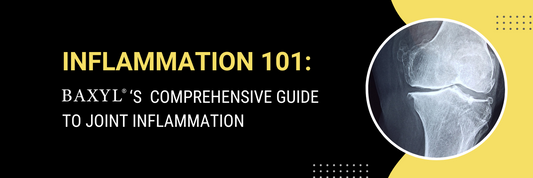It’s the most wonderful time of the year. We’ve arrived at the time of the of countless celebrations which means lots of goodies! Holiday gatherings. Office potlucks. It seems hard to resist those homemade treats like Aunt Linda’s famous fudge or Susie’s stellar sausage balls. But do you know the consequences of those overeating binges?
Upset stomachs. Acid reflux. Heartburn. These can all be the end result of too much of a good meal or too many office snacks. And unfortunately, these can ultimately lead to gastroesophageal reflux disease (GERD).
To recognize GERD Awareness week this November, let's take a minute to learn about what this illness is and why gut health plays an integral role in managing irritation in your stomach lining.
What is GERD?
Gastroesophageal reflux disease (GERD) is a digestive issue. GERD happens when stomach acid flows in your esophagus repeatedly from your mouth to stomach. This is known as acid reflux and can irritate the lining of your esophagus.
People can and will experience acid reflux occasionally. However, when acid reflux repeatedly occurs over time, it can cause GERD.
Causes of GERD
Although it is challenging to pinpoint one single cause of GERD, there are several lifestyle circumstances that can lead to GERD. They include the following:
- Being overweight
- Overeating
- Eating foods like citrus, chocolate, and fatty or spicy foods
- Having caffeine
- Drinking alcohol
- Smoking
- Using aspirin and over-the-counter pain and fever medicines. These include nonsteroidal anti-inflammatory drugs (NSAIDs) such as ibuprofen and naproxen.
Particular health problems that could cause heartburn, leading to GERD, or make it more likely, include:
- Swelling of your stomach lining (gastritis)
- Painful sores (ulcers) on the lining of your stomach or esophagus, or the first part of your small intestine (duodenum)
- An allergic condition in the esophagus (eosinophilic esophagitis)
Symptoms of GERD
The following are signs and symptoms that a person could be experiencing GERD:
- Heartburn, which is described as a burning sensation in the chest, usually after eating. It might be worse at night or while lying down
- Regurgitation or backwash of food or sour liquid
- Upper abdominal or chest pain
- Trouble swallowing (dysphagia)
- Sensation of a lump in your throat
- Acid reflux
If you have nighttime acid reflux, you might also experience:
- An ongoing cough
- Inflammation of the vocal cords (laryngitis)
- New or worsening asthma
The Four Stages of GERD
There are four stages of GERD, ranging from mild to severe. While a majority of people suffer from mild GERD, it still isn’t pleasant.
Stage 1: Mild
This is characterized by mild heartburn and/or regurgitation. Most symptoms can be regulated by simple lifestyle changes like monitoring particular food intake such as spicy or fatty foods, alcohol or grease. A GERD sufferer should not eat too late at night, lay down immediately after eating and can try elevating the head of the bed to eliminate acid reflux. Mild GERD is typically soothed with an over-the-counter antacid.
Stage 2: Moderate
The moderate stage of GERD occurs in about one-third of those who have GERD, and symptoms occur several times a week. Increased frequency of acid reflux in this stage causes more significant inflammation in the lower part of the esophagus.
Those who do suffer moderate GERD should seek medical care, as a prescription may be needed for relief.
Stage 3: Severe
Severe GERD introduces more significant problems both in the symptoms of GERD and the ongoing and severe inflammation in the esophagus. Roughly 15% of people with GERD are in stage 3. They experience significant symptoms that may occur several times a week or even daily.
People who suffer from severe GERD have found that their symptoms are not capable of being controlled with medications. They are at risk of developing serious complications of GERD and should be cared for by a GERD specialist.
The specialist may recommend advanced testing such endoscopy, esophageal manometry and pH studies in order to develop an appropriate treatment plan.
Stage 4: Reflux-induced Precancerous Lesions or Esophageal Cancer
When a person reaches this most severe level of GERD, it represents the most serious consequence of long-term reflux. Nearly 10% of people who suffer from GERD will progress to this stage if their reflux remains uncontrolled over time.
Treatment can include surgery or cancer treatment if esophageal cancer is found. If you or someone you care about believe to have stage 4 GERD, make schedule an appointment with a medical specialist immediately.
If you’re looking to avoid reaching advanced stages of GERD, where medical intervention is necessary, early treatment solutions are key.
How to Treat GERD
So, are you wondering how to treat GERD?
If you are not sure if you have GERD or not, you should seek medical attention for further diagnosis and treatment. Nothing beats a care plan strategically developed with a medical professional.
That said, there are things you can do to alleviate symptoms even without medical support. Simple lifestyle changes can often benefit someone with early stages of GERD. That’s why we encourage anyone struggling with acid reflux, even if they don’t have GERD, to take a proactive approach with lifestyle choices to hopefully prevent the condition.
Lifestyle Changes
You should seek out the advice of a medical professional if you’re concerned that you may have GERD or are experiencing heartburn or acid reflux-like symptoms. Having said that, if you’ve been diagnosed and are looking for noninvasive treatment alternatives, daily oral supplementation with an FDA-approved product may be beneficial for treatment.
When it comes to how to treat GERD, lifestyle changes can significantly reduce symptoms and improve overall quality of life.
Here are some lifestyle changes you can make to improve your GERD symptoms or minimize your risk of developing the condition:
Maintain a Healthy Weight:
Weight can play a major part in the severity or long-term development of GERD. In fact, excess weight puts pressure on your stomach, which can force acids up into your esophagus—causing or worsening GERD symptoms. This isn’t just true for obese patients either, being slightly overweight can impact GERD.
So, yes, losing just a few pounds can potentially dramatically improve your heartburn and other GERD symptoms. Some people notice that their GERD completely goes away after they lose weight.
We encourage you to aim for a healthy body mass index (BMI) by incorporating a balanced diet and regular exercise into your daily routine. If you’re not sure where to start, consult a healthcare professional or a registered dietitian.
They can help you create a personalized diet and exercise plan that suits your specific needs and limitations.
Avoid Trigger Foods:
A major contributing factor to acid reflux is the food we eat. So, looking into how to treat GERD? It’s all about diet.
Certain foods are higher in acidity, which can upset the stomach or lead to acid buildup. Stay away from spicy foods, high-fat meals, citrus fruits, tomatoes, onions and chocolate. All these foods can trigger acid reflux symptoms.
Likewise, we recommend you limit or avoid caffeine, alcohol and carbonated beverages. They can relax the lower esophageal sphincter, allowing stomach acid to flow back into the esophagus. And when trying to improve your GERD, that’s the opposite of what we want.
Eat Smaller, More Frequent Meals:
As you’ve probably realized by now, what we eat and how often we eat it plays a big part in treating GERD. So, changing your eating habits, not just your diet, can be a big help. Opting for smaller portions can reduce the pressure on your stomach and minimize acid reflux episodes.
While we do recommend losing weight to help improve GERD, make sure you’re still eating enough. It’s important that treating GERD doesn’t lower your quality of life. Likewise, you never want to stop getting the nutrition you need for fear of triggering an episode. Your overall health is equally important.
Something that can help is to consume meals slowly and chew thoroughly. This helps with digestion and can minimize your risk of overeating.
Post-Meal Practices:
So, this advice might feel a little impractical, but how we engage our bodies after eating can play a big part in how we feel. For that very reason, we encourage you to avoid lying down immediately after meals.
Laying down can cause the acid in your stomach to pool or leak into your esophagus if you’re dealing with more severe GERD/esophageal laxity. Instead, remain in an upright position for at least 2-3 hours after eating to allow for proper digestion.
Likewise, you should try to engage in light activities, such as taking a leisurely walk, after you eat. This can support your body with digestion and minimize the risk of acid reflux long-term.
Elevate Your Upper Body:
This change is more person-specific, because not everyone deals with acid reflux as they sleep. That said, if you do deal with acid reflux at night, we encourage you to raise the head of your bed by 6 to 8 inches. There are a few ways to do this: the easiest are placing blocks under the head of your bed or using a wedge-shaped pillow.
It might sound strange, but this position can help prevent stomach acid from flowing back into the esophagus while you sleep. It’s not a big change, but can dramatically improve your quality of life.
Quit Smoking:
If you smoke, make efforts to quit. Smoking can weaken the lower esophageal sphincter and increase acid reflux symptoms.
We encourage anyone struggling with smoking addiction to get help. Healthcare professionals, support groups or smoking cessation programs can make the difference in helping you successfully quit.
Important Notes About How to Treat GERD
When it comes to “how to treat GERD,” patience is the name of the game. No treatment solutions are going to be immediate.
Implementing these lifestyle changes can take time and effort, but they can significantly reduce GERD symptoms and improve your overall well-being. Additionally, keeping a food diary to track your meals and symptoms can help you identify specific triggers and adjust your diet accordingly.
Working closely with a healthcare provider or a registered dietitian can provide you with personalized guidance and support throughout your journey to managing GERD effectively.
Improve Your GERD Symptoms
Are you looking for additional information about how to treat GERD at home? You should consider consulting your doctor. Or, learn more about GERD from the International Foundation for Gastrointestinal Disorders by visiting their website. You can also check back in to our ‘News’ section for more helpful blogs and articles about gut and digestive health.
Though daily oral supplementation may be an advisable method of supporting GERD symptoms, understanding nutrition and bioavailability of nutrition within the human body is tough. After all, it's a complicated and complex process that requires a knowledge of biological cells on the microscopic and molecular level.
Identifying the best treatment options for GERD, treatment options for acid reflux, or treatment options for heartburn is a personal journey that should necessitate thorough research.
Vitamins & Supplements for GERD
One lifestyle choice you can make it to take care of your digestive health is the ingestion of daily supplements and vitamins. They can help support a healthy digestive environment inside the body.
With many different options for gut health products currently on the market, it is easy to get overwhelmed by the many different terms used in marketing or research.
We attempt to identify a few vitamin and supplement ingredients that have been scientifically proven to relieve the symptoms of digestive issues like GERD, heartburn and acid reflux:
How Hyaluronic Acid Affects GERD Symptoms
When you initially think about hyaluronic acid, there is typically a mental correlation between HA and the management of joint health. This is not surprising because most hyaluronic acid, or hyaluronan, in the body is found in the skin, joints, gut and eyes. A good high-molecular weight hyaluronic acid liquid oral supplement will have internal benefits within all of these biological systems.
When it comes to symptoms associated with digestive health, however, hyaluronic acid plays a key role in creating a healthy gut environment and soothing an irritated or painful stomach lining. A high-molecular weight hyaluronic acid acts as a muco-adhesive to your stomach lining and restores a smooth, hydrated barrier that will protect it from further irritation. Symptoms of GERD, acid reflux or heartburn are often chronic because there is no way to regulate gastric acid or enzymes without a strong, hydrated barrier in the stomach lining.
Furthermore, hyaluronic acid promotes a healthy gut microbiome as it is absorbed by the blood and distributed throughout the body. There is also something called the gut-skin-brain axis. The gut-skin-brain axis is named as such because all three of these organs work together in the body. For example, a patient may be feeling fatigued or foggy might have a gut microbiome bacteria issue in the blood stream because the gut wall has become leaky. A healthy gut plays a pivotal role in inflammation and metabolic function.
Treating GERD with Prebiotics
Prebiotics and probiotics and post-biotics, oh my! With so many commercials or ads celebrating certain supplements for gut health support, how do you know how to pick the right one for you? An important factor may be defining what those terms are when it comes to gut microbiota.
Your stomach and esophagus contain ‘good’ and ‘bad’ bugs (bacteria, viruses, fungi, protozoa). A healthy gut requires a strong balance between prebiotics and probiotics. When it comes to prebiotics vs. probiotics vs. postbiotics, probiotics are the good gut bacteria that we eat in our food while prebiotics are the food in the gut that the good bacteria eats. Postbiotics are typically positive or healthy byproducts produced by the life processes of probiotics.
Some patients with chronic GERD symptoms will be prescribed proton pump inhibitor (PPI) medications by their doctor in order to decrease stomach acid, heal the digestive lining, and help soothe irritation. A side effect of these medications, however, can sometimes results in what is known as small intestine bacterial overgrowth (SIBO) – meaning an overgrowth of gut bacteria in the small intestine. Probiotics have been research-proven to provide relief and support for this kind of proton pump inhibitor side effect.
Just like our bodies, the living environment within a bacteria cell needs nutrients and balance to produce the best possible results. If probiotics (good gut bacteria) have the ability to naturally reduce or treat the symptoms of GERD, then the food that good gut bacteria ingests plays an important role in probiotic function (i.e. prebiotic).
Some prebiotics, in fact, have been shown to improve digestibility, nutrition and immunity response in both humans and animals alike when taken orally as a supplement over time.
Lion’s Mane and GERD
Lion’s Mane Extract is derived from lion’s mane mushrooms which are rich in beta glucan content and support enhanced gastroprotection. Lion’s mane extract encourages the growth of good gut bacteria with prebiotic fiber. Lion’s mane is organically very nutrient-dense and filled with essential vitamins and minerals that support the body’s digestive tract.
Lion’s mane mushrooms are rich in thiamine, riboflavin, niacin, manganese, zinc and potassium. Lion’s mane mushrooms are also a great source of oligosaccharides, a specific type of carbohydrate that have many critical biological functions including antioxidative and anti-tumor activities.
Supplemental Support With Baxyl
If supplements sound like the lifestyle change for your digestive health, then we encourage learning more about Baxyl® GI.
While not a treatment for GERD, Baxyl GI targets the source of stomach issues and is formulated specifically for gut health and optimal digestion.
Baxyl GI combines the soothing, gastric benefits of MHB3® Hyaluronan and a proven precision prebiotic—A.O. Prebiotic—to ease the stomach and promote healthy stomach pH and digestion. It is a natural alternative to proton pump inhibitors (one of the treatments recommended for Stage 3 GERD) and is safe for continuous daily use.
More about Baxyl Benefits
It is research-proven and was developed right here in the U.S. by women in science. It is a completely hydrolyzed supplement, and its liquid formula allows for quick absorption.
Furthermore, Baxyl GI benefits include:
- 100% vegan-friendly
- Full ingredient traceability
- No artificial colors or flavors
- High concentration
- No known drug interactions
- No known side effects
- Gluten-Free
- Dairy-Free
- Calorie-Free
- Soy-Free
- Sugar-free
- Non-GMO
- Cruelty-free
Baxyl GI is easy to take and comes in a pump, pre-dosed administration bottle. For the first week, take two pumps daily followed by one pump daily per the label instructions to prevent and treat GERD. The convenient additional pump allows for less mess and easy dosing.
Where do I find Baxyl GI?
Baxyl GI is sold at select retailers and health food stores across the U.S. You can find your closest retail outlet by searching online.
Do you prefer the convenience of shopping online? You can also buy Baxyl GI and other Baxyl products online.
------------------------------------------------------------------------------------------------
*This article is for educational purposes only. The above statements have not been evaluated by the Food & Drug Administration and are not intended to treat, diagnose, prevent, or cure any disease.



